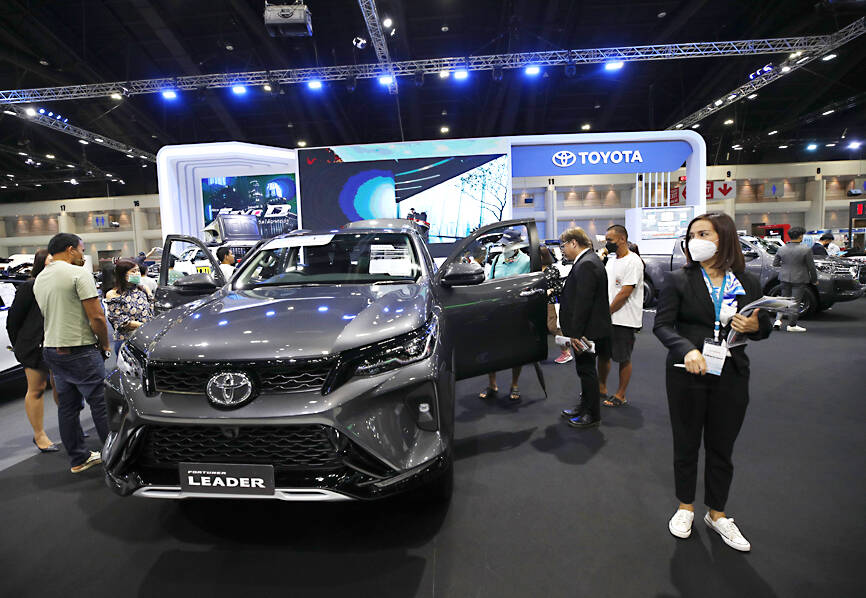Toyota Motor Corp is poised to keep its title as the world’s best-selling vehicle manufacturer, beating Volkswagen AG (VW) for the fourth consecutive year after steady demand across North America and Europe helped sales and production reach new records last month.
Global sales — including that of subsidiaries Hino Motors Ltd and Daihatsu Motor Co — rose 12 percent from a year earlier to 986,262 units, the most ever for the month of November, the company said yesterday. The company’s worldwide production reached an all-time high at 1,067,446 units.
The world’s biggest vehicle maker has been making and selling an unprecedented number of cars throughout the year, further securing its dominance with hybrid cars as it pushes forward with ambitious plans to mass-produce electric vehicles (EVs) and catch up with Elon Musk’s Tesla Inc and China’s BYD Co (比亞迪).

Photo: EPA-EFE
However, Toyota was last week dragged into a scandal after an investigation found that Daihatsu had manipulated collision safety data dating as far back as 1989.
It is not yet clear how much the latest scandal would cost, in terms of output, money and customer trust. Third-party investigators warned that numerous Toyota and Daihatsu brand vehicles need to undergo safety inspections again to become certified properly, and that several models could be ordered off the road.
Meanwhile, as BYD is set to overtake Tesla as the world’s best-selling EV maker, hybrids are becoming increasingly dominant in Japan. They are expected to overtake all other powertrains, including combustion and diesel engines, in registered passenger vehicle sales by the end of the year, according to Bloomberg Intelligence.
Toyota said its hybrid sales rose 52 percent year-on-year last month, while battery EV sales increased by 227 percent.
In a sector still dominated by more familiar names like Toyota, Volkswagen and General Motors Co, Chinese manufacturers including BYD and SAIC Motor Corp (上海汽車) are making serious inroads. After leapfrogging the US, South Korea and Germany over the past few years, China now rivals Japan for the global lead in passenger car exports. About 1.3 million of the 3.6 million vehicles shipped from China as of October this year were electric.

When an apartment comes up for rent in Germany’s big cities, hundreds of prospective tenants often queue down the street to view it, but the acute shortage of affordable housing is getting scant attention ahead of today’s snap general election. “Housing is one of the main problems for people, but nobody talks about it, nobody takes it seriously,” said Andreas Ibel, president of Build Europe, an association representing housing developers. Migration and the sluggish economy top the list of voters’ concerns, but analysts say housing policy fails to break through as returns on investment take time to register, making the

‘SILVER LINING’: Although the news caused TSMC to fall on the local market, an analyst said that as tariffs are not set to go into effect until April, there is still time for negotiations US President Donald Trump on Tuesday said that he would likely impose tariffs on semiconductor, automobile and pharmaceutical imports of about 25 percent, with an announcement coming as soon as April 2 in a move that would represent a dramatic widening of the US leader’s trade war. “I probably will tell you that on April 2, but it’ll be in the neighborhood of 25 percent,” Trump told reporters at his Mar-a-Lago club when asked about his plan for auto tariffs. Asked about similar levies on pharmaceutical drugs and semiconductors, the president said that “it’ll be 25 percent and higher, and it’ll

CHIP BOOM: Revenue for the semiconductor industry is set to reach US$1 trillion by 2032, opening up opportunities for the chip pacakging and testing company, it said ASE Technology Holding Co (日月光投控), the world’s largest provider of outsourced semiconductor assembly and test (OSAT) services, yesterday launched a new advanced manufacturing facility in Penang, Malaysia, aiming to meet growing demand for emerging technologies such as generative artificial intelligence (AI) applications. The US$300 million facility is a critical step in expanding ASE’s global footprint, offering an alternative for customers from the US, Europe, Japan, South Korea and China to assemble and test chips outside of Taiwan amid efforts to diversify supply chains. The plant, the company’s fifth in Malaysia, is part of a strategic expansion plan that would more than triple

Taiwanese artificial intelligence (AI) server makers are expected to make major investments in Texas in May after US President Donald Trump’s first 100 days in office and amid his rising tariff threats, Taiwan Electrical and Electronic Manufacturers’ Association (TEEMA, 台灣電子電機公會) chairman Richard Lee (李詩欽) said yesterday. The association led a delegation of seven AI server manufacturers to Washington, as well as the US states of California, Texas and New Mexico, to discuss land and tax issues, as Taiwanese firms speed up their production plans in the US with many of them seeing Texas as their top option for investment, Lee said. The